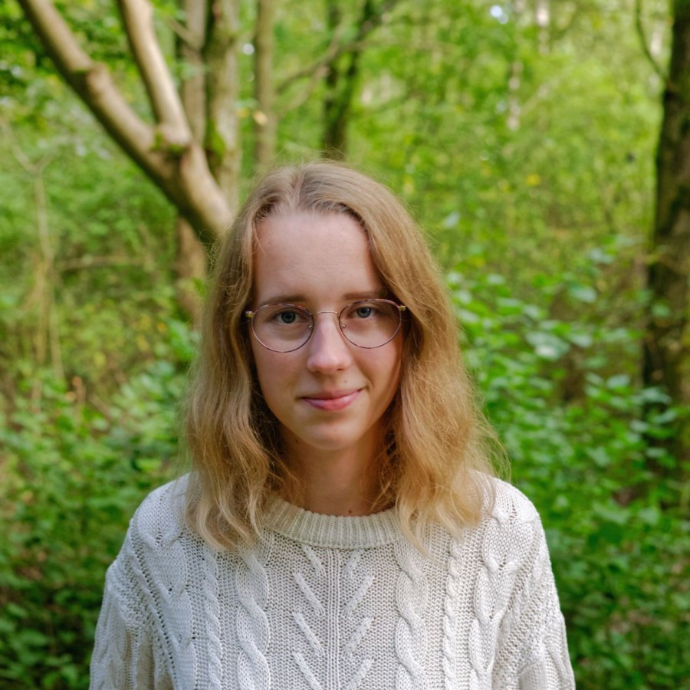Promovendus Hedwig Sekeres een van de nieuwe KNAW Faces of Science
Hedwig Sekeres, promovendus bij de Faculteit der Letteren van de Rijksuniversiteit Groningen, is één van de nieuwe Faces of Science, een netwerk van promovendi uit heel Nederland die zich bezighouden met wetenschapscommunicatie. Op de website van Nemo Kennislink vertellen zij over hun wetenschappelijk onderzoek en het leven als promovendi. Sekeres gaat in haar bijdragen voor de website onder meer in op het belang van taal in het algemeen en van streektaal in het bijzonder. Faces of Science is een project van NEMO Kennislink, de KNAW en De Jonge Akademie.
Tekst: Marjolein te Winkel

"Ik vind het belangrijk om wetenschap toegankelijk te maken voor een groot publiek”, ligt Sekeres haar nieuwe rol toe. “Dat is een plicht van een wetenschapper, en ik vind het een leuke uitdaging om dat op een pakkende en aansprekende manier te doen.”
Sekeres doet onderzoek naar streektaal: "Ik onderzoek klankveranderingen in het Gronings en breng in kaart hoe het Gronings, en subvarianten van het Gronings, in de afgelopen vijftig jaar zijn veranderd. Daarnaast onderzoek ik de sociale hiërarchie tussen de verschillende Groningse dialecten en in hoeverre die van invloed is op veranderingen in dialecten."
Behoud van streektaal
Het aantal sprekers van streektaal en dialecten neemt al decennialang af. Juist daarom, zegt Sekeres - die als masterstudent een cursus Gronings volgde bij het Groninger Centrum voor Taal en Cultuur en de taal inmiddels redelijk beheerst - is het belangrijk om te weten hoe taal verandert en hoe mensen zich verhouden tot hun (streek)taal. “Die kennis kan bijdragen aan het actief behouden van streektalen.”
Sekeres heeft, als promovendus in het onderzoeksteam van prof. dr. Martijn Wieling, al de nodige ervaring met wetenschapscommunicatie. Ze reisde met het mobiele Spraaklab naar festivals als Noorderzon, Zpannend Zernike en Zwarte Cross, ontwikkelde samen met haar collega-promovendi Raoul Buurke en Lourens Visser het bordspel Streektaalstrijd en legt nu in samenwerking met Centrum Groninger Taal & Cultuur de laatste hand aan een mooc, een gratis online cursus Gronings voor beginners.
In haar maandelijkse bijdragen voor de website van Faces of Science wil Sekeres taalbesef in het algemeen, en streektaal in het bijzonder onder de aandacht brengen. “Maar ik wil ook graag meer vertellen over onderzoek doen: hoe doe je wetenschappelijk onderzoek, hoe pas je wetenschappelijke methodes toe, hoe interpreteer je wetenschappelijke resultaten?”
Over Faces of Science
Faces of Science is ingesteld in 2013 en bestaat uit promovendi uit heel Nederland. Ze schrijven en vertellen over hun onderzoek, maar ook over hun leven als jonge wetenschapper en wat daar allemaal bij komt kijken. Zo kunnen zij bijvoorbeeld aan jongeren die staan voor een studiekeuze laten zien hoe het is om wetenschapper te zijn.
De Faces of Science gebruiken blogs, vlogs, artikelen, lezingen, optredens in de media en activiteiten op sociale media om over hun onderzoek en hun leven te vertellen. Zij krijgen handvatten en trainingen aangeboden om hun vaardigheden met wetenschapscommunicatie verder te ontwikkelen. De onderzoekers krijgen begeleiding vanuit NEMO Kennislink om hun onderzoek in toegankelijke taal naar voren te brengen, zodat iedereen het kan begrijpen. De ‘Face of Science’ kunnen ook gevraagd worden om hun onderzoek te presenteren op scholen, in de media, op festivals of andere evenementen.
Meer nieuws
-
14 februari 2026
Tumor weg, maar waar zijn de woorden?
-
19 januari 2026
Digitalisering drijft kansarme burgers soms in het nauw
